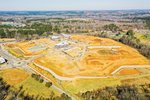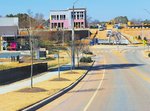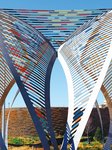



_Chatham_Park_Sign_887.jpg)

Editor’s note: This is the second of a two-part series examining what 2021 will mean for Chatham Park. Last week’s story focused on where the development stands now, with the first residents moving in. This story looks at the partnership between developers Tim Smith and Bubba Rawl and the “work, play, learn” focus of Chatham Park’s future.
PITTSBORO — A few years ago, a candidate seeking a seat on the town’s board of commissioners met with Tim Smith and Julian “Bubba” Rawl to ask questions about Chatham Park, trying to ascertain whether the massive development was a good thing or a bad thing for Pittsboro.
“He said, ‘Look, I went out and knocked on 408 doors, and 402 people were all for Chatham Park,’” recalled Rawl, a partner with Smith in Preston Development Company. “‘And only six people opposed it.’”
Today, with its first homes occupied, more businesses in the Mosaic development opening soon and construction on infrastructure and more occurring at every turn, potential residents and businesses are now the ones knocking on Chatham Park’s doors. The 7,068-acre development Rawl and Smith and their Preston Development team are creating north of downtown Pittsboro is expected to add as many as 60,000 people to the small town’s population with 22,000 homes and 22 million square feet of office, research, retail and community space by its target completion date in 2045.
In addition, the North Village and South Village sections of Chatham Park will contain 2,000 acres of open park spaces, 30 miles of walking and bike trails, its own wastewater treatment systems, 5G cell service, gigabit internet and the other kinds of amenities that will make the development’s “live, work, play, learn” mantra real — making Chatham Park a good thing, even for the skeptical town commissioner, the six naysayers he encountered during his campaign for office, and others who have wondered what the fuss was all about.
Rawl thinks proof of that positive impact will come not just from the explosive tax base that will result, but with something not often brought up in discussions about Chatham Park: jobs.
“So many people leave Pittsboro because there’s no place for them to further their professional life,” he said.
That’ll change with Chatham Park.
“We’ll have a lot more of a ‘live, work, play and stay’ environment,” Rawl said, “instead of a ‘live, work, play and leave.’”
Mosaic alone — the 44-acre “gateway” to Chatham Park, with its 300,000 square feet of retail, restaurants and office space, hotel and entertainment venues north of the U.S. Hwy. 15-501 and Hwy. 64 intersection — will ultimately employ 2,000 workers, Rawl estimates. Chatham Park’s outparcels will add even more when fully built out, boosting Chatham’s economic fortunes significantly along the way.
And when that happens, the fortunes of Preston Development Company, too.
Smith and Rawl have been working together as developers for 39 years. Their list of projects includes Landfall in Wilmington, a 2,200-acre oceanfront private community with 2,000 homesites, and Preston, a Cary community which includes the 54-hole Prestonwood County Club golf course. Aside from Chatham Park, the Preston “portfolio” also includes nearly two dozen completed projects and more than a half dozen others in various stages of development, including Arboretum in Cary, Ashley Village in Cary, South Lakes in Fuquay-Varina, Carolina Colours in New Bern, Knightdale Station in Knightdale and Southport Marina in Southport.
“We’re good friends,” Rawl said of himself and Smith. “And we’ve been, I would say, complementary business partners. Tim’s got a skillset that well surpasses mine, and every now and then I’ll come up with an idea that he says is pretty good idea, and we’ll throw that into the mix.”
Rawl laughs.
“So we’re a little bit like Sonny and Cher,” he said. “I mean, Cher is still on the stage, and Sonny ran into a tree, so…”
Smith turns serious.
“No, we do real well,” he said. “Bubba does certain things well, and I do certain things well. And Vanessa [Jenkins, PDC’s executive vice president] picks up where we leave off. We’ve been a great team, and the work has strengthened our relationship. And we’re real proud of what we’re doing — and we’ll be more proud when we get more people in houses living here in Chatham Park.”
Jenkins, one of a number of PDC staff members working with the two for more than 25 years, said tenure is rare in the development business. There’s a reason why: huge dollars ride on decisions, and the stress can be a pressure-cooker for those involved.
“Tim and Bubba are fantastic leaders and entrepreneurs and encourage those around them to be the same,” she said. “They’re passionate about what they do and they are providing the very best possible in everything they do. It doesn’t have to cost the most — but it has to be done right. We want to look at any project we complete and be proud of the finished product.”
It’s a common sight, she says, to see the two partners stop and pick up trash on a project, “grab a broom, mop or cleaning cloth to take care of something they see that needs attention.” They’re far from figureheads or absentee owners, Jenkins said, and that hands-on approach encourages PDC’s staff to “give 200%.”
The commitment to Chatham Park has been time-tested, but in the 17-year span of time between first considering the northern section of Chatham County as a hotbed for a development, the vision of growth Smith and Rawl anticipated in the region from Chapel Hill, western Cary and Apex toward Sanford has occurred. They envisioned Preston Development Company as the entity to provide homes for families who would settle here — giving those future residents, as Rawl says, “the best place they can possibly live.”
With residents now beginning to call Chatham Park home and the creation of infrastructure and businesses visible at every turn, their vision for the development is crystallizing.
“We looked into the future, and we saw Pittsboro,” Smith said.
Have they gotten to the point where they envision a profit on their work, a return on investment that right now exceeds $200 million? Do they think about that?
“We think about it every minute of every hour of every day,” Smith said. “Yeah, we’ve got a lot invested, and the size of this project requires investment. We won’t see a profit come out of this thing for 10 years — at least 10 more years. That’ll be for our children and grandchildren … We’re not writing out any deposit slips now. We’re writing checks.”
And they’re not seeking accolades, they say; rather, the reward, in addition to the financial ones, will also accrue to them when people — like the thousands who live among the long list of already-completed PDC developments around the state — choose Chatham Park. That will make the work, the risks, the setbacks and the frustrations worth it.
“I don’t believe anybody’s coming in here to say they came here because of all of our late nights,” Rawl said. “They’ll come because of the finished product. They’ll come because the lifestyle is there. We’re saying that we want to sculpture a neighborhood that will be attractive for many years to come. And we’re not really looking for anybody to pat us on the back for all the scar tissue we’ve gotten from it. We’re more interested in having a quality project that will represent itself well for decades to come.”
The quality of the work, and the sum total of Chatham Park’s deliverables, will stand on their own merits, Rawl believes.
He thinks back to the town commissioner candidate and the six residents on the candidate’s campaign trail who were opposed to Chatham Park. The takeaway, according to Rawl: “A few people can make a big ripple in a big pond. And I think that’s what we’ve had … that force, pushing against us.
“Candidly, I think they now realize we’re not over there destroying the world,” he continued. “They see the quality of what we’ve done so far. If they want to ride through the Vineyards, you’ll see one of the nicer community neighborhoods that has been built in the state of North Carolina, much less what’s been built in Chatham.”
Is there anything they’d do differently?
“Oh, yeah, probably 10,000 things we would do differently,” Smith said. “But to name something specific, I don’t really know. You know, we might not have bought as much land as we did. But as far as planning and everything, I think we made good solid choices. We were stymied on our approvals a lot by the town. And that killed us on a lot of things. But we’re getting them done ... We’re kind of excited about where we are right now.”
The real stories about Chatham Park, Rawl said, “are yet to be written.”
“The good stories are in front of us,” he said. “And so we’re excited to be able to provide that canvas to throw some new paint on.”